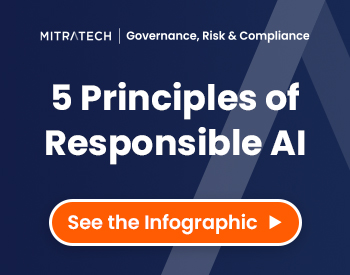Analyzing the Trends in Misinformation, Technological Advances, Cyber Insecurity, and Interconnected Risks in the 2024 Global Risks Report.
The World Economic Forum recently released its 2024 Global Risks Report, an ongoing, worldwide risk analysis in collaboration with Zurich and Marsh McLennan. Drawing on the findings of the Global Risks Perception Survey (GRPS) involving nearly 1,500 global experts, the report analyzes short-term (2 years) and long-term (10 years) risks, offering key takeaways for GRC practitioners.
Let’s delve into the key highlights and how you can prepare your organization.
 Misinformation and Disinformation: Navigating the Web of Global Risks
Misinformation and Disinformation: Navigating the Web of Global Risks
Easy-to-use interfaces for big Artificial Intelligence (AI) models are causing a rise in fake information and synthetic content (such as advanced voice copying and fake websites.) According to WEF’s report, this shift puts misinformation and disinformation as the number one global risk ranked by severity over the short term.
As a response to the escalating risks posed by these developments, governments are initiating the implementation of dynamic regulations. These evolving rules aim to address the responsibilities of both online disinformation hosts and creators. They also reflect a global effort to mitigate the impact on the Global Risk and Compliance industries.
Amidst an increase in regulatory activity surrounding AI Governance, more organizations are looking to create a responsible foundation that lays the path for scalable AI innovation down the line. This includes best practices like keeping a single inventory of AI and ML technology, leveraging full version and change control, etc.
 Technological Advances and Geopolitical Dynamics: A Shifting Landscape
Technological Advances and Geopolitical Dynamics: A Shifting Landscape
The intersection of technological advances and geopolitical dynamics presents a complex landscape where divides are deepened on a global scale. The development of AI, fueled by both commercial incentives and geopolitical imperatives, has the potential to exacerbate existing disparities. Especially in terms of digital accessibility and capability.
As major powers prioritize their strategic interests in AI development, the Global Risks Report indicates a significant risk of widening the digital gap between high and low-income countries. This divergence could leave vulnerable groups further marginalized, hindering their ability to leverage AI for economic, social, and technological advancement.
GRC professionals should navigate this landscape with foresight, keeping an eye on regulatory activity (like the U.S. AI Executive Order, EU AI Act, etc.). They must also track the global response and work to ensure that their AI regulatory frameworks address ethical and equitable deployment. An AI Governance strategy that fosters secure accessibility, cross-departmental visibility, and collaboration can help.
 Interconnected Risks: Mapping the Global Risk Network
Interconnected Risks: Mapping the Global Risk Network
The WEF report ranks interconnected risk as a top concern due to the complex nature (and sheer volume) of relationships and dependencies between an organization’s risk factors. Here the impact of one risk can significantly influence the likelihood and consequences of others within an organization’s governance framework. The report uses the nexus between societal polarization and economic downturn as an example of how each influences the others.
Imagine a cybersecurity breach during a period where economic stressors (like staffing challenges, financial instability. etc.) are already spreading your team and technology thin. If malicious actors are targeting critical infrastructure or manipulating public sentiment through disinformation campaigns when your resources are lacking, it creates a perfect storm. The interconnected nature will amplify the overall impact on your businesses, reputation, and resilience.
Addressing interconnected risks becomes crucial to avoid a cascading effect that could lead to widespread systemic failures. By understanding the potential ripple effects and implementing a comprehensive, integrated GRC framework, organizations can proactively prepare.
 Cyber Insecurity: Navigating Threats and Resource Challenges
Cyber Insecurity: Navigating Threats and Resource Challenges
Cyber insecurity, or the vulnerability of an organization’s operational network to potential threats, stands as a formidable challenge for GRC industries. 39% of respondents believing cyberattacks present a material crisis on a global scale in 2024. The escalating frequency and sophistication of cyber threats pose a direct threat to the integrity and confidentiality of sensitive data. All while jeopardizing compliance efforts and exposing organizations to severe risks.
Teams are confronted with the pressing need to fortify digital infrastructure and enact robust cybersecurity measures now. Specifically one that can safeguard against a new generation of data breaches, financial fraud, and operational impact. Amidst these challenges, staffing shortages and tightening budgets add an additional layer of complexity to the task at hand. The interconnected nature of cyber insecurity with regulatory compliance demands continual adaptation of strategies to meet evolving regulatory requirements.
GRC professionals must be vigilant in developing proactive cybersecurity protocols, fostering a resilient cyber risk management framework (that can align with their company’s bottom line). The key lies in striking that delicate balance between driving effective cybersecurity measures and navigating today’s ongoing budget and staffing constraints.

Opportunities for Action: Charting a Connected Course in a Fragmented World
The Global Risks Report concludes by highlighting the importance of localized strategies and global collaboration as critical for risk reduction. An organization’s framework should proactively leverage risk and compliance initiatives, investing in technologies and collaborating internationally to address global risks.
Equipped with an understanding of the challenges listed in this blog, GRC professionals are urged to navigate this landscape strategically. That involves adopting adaptive frameworks that embrace foresight and collaboration to ensure resilient governance structures globally.
Elevate your GRC program today!
Reach out to our team with any questions, schedule a demo or learn more about Mitratech’s GRC solutions.





